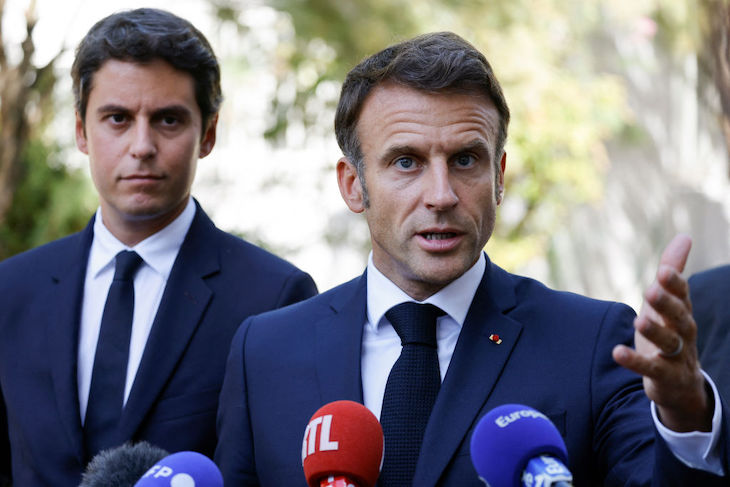France’s Emmanuel Macron, the Fifth Republic’s youngest president, has just appointed its youngest prime minister, 34-year-old Gabriel Attal. The former socialist turned 2017 Macronista campaigner has had a meteoric rise through government ranks to education minister only six months ago. Attal’s remarkable communication skills, ability to think on his feet and interpret what voters wish to hear has made him Macron’s most popular minister.
But this is a further desperate roll of the dice for a beleaguered Macron. The French leader has been deprived of a working majority since the 2022 legislative elections and forced to get his legislation by constitutional sleight of hand avoiding parliamentary votes 23 times. That legislation on pension and social reform has been broadly unpopular generating widespread strikes, followed last July by the worst riots for over fifty years deep into the sinews of provincial France, la France profonde. Macron’s party trails Marine Le Pen’s Rassemblement National by ten points in opinion polls and is braced for a trouncing in the June European elections. For the Europhile Macron, this would be a humiliation too far. Hence the sacking of the dutiful, but dour, technocrat PM Élisabeth Borne and replacement by the boy-wonder Attal. But the public are unlikely to be fooled by such pyrotechnics.
This is a further desperate roll of the dice for a beleaguered Macron
A critical question is whether Attal’s appointment leads to Macron shifting further to the right. Both started on the left, but have slid gently rightwards shadowing the French public at one step removed. Marine Le Pen recently stated over the highly controversial new immigration legislation – hijacked by the right to render it far more restrictive – that it was her Rassemblement national party that was setting the national agenda. There is no doubt that in appointing Attal, Macron has chosen a young dynamic champion to rival the even younger, effective and popular Jordan Bardella, who currently presides the RN, heads its European election list and who is a possible contender for the 2027 presidentials.
The risk Macron is taking here is an admission of failure by going against all his prime ministerial appointments thus far. Attal’s predecessors have been technocrats with little political skill, or in the case of Edouard Philippe a popular premier who was jettisoned for that reason. Now he has appointed a popular, politically skilful and ambitious successor who could outshine his creator. But the knives will be out for Attal, precisely because he is seen as a mini-Macron, the man who destroyed the traditional parties and revenge will be sweet.
For all his political acumen, Attal is likely to be afflicted by the Malédiction de Matignon, to borrow the title of a recent book about the prime minister’s role under the Fifth Republic. The occupier of the Hotel Matignon has the worst of all worlds. Squeezed between the Elysée, parliament and highly-ambitious ministers who want his job (he was a mere junior minister six months ago), the premier is also expected to take the blows aimed at the president. Moreover he is on a permanent ejector seat (it is said that a PM signs their resignation letter on appointment). Will Attal stay the course?
Attal’s task will be harder precisely because he is viewed from left to right as a Macron clone, a ‘mini-moi’. Jean-Luc Mélenchon sardonically dismissed him as a non-entity who started as the government’s official spokesman (which he was) only to end up as Macron’s mouthpiece. Some protection may be at hand. He is the first openly gay French prime minister, who lives in a civil partnership with another of Macron’s inner circle, Stéphane Séjourné, his former political advisor now heading up Macron’s party in the European parliament. Le Monde referred to them in October 2021 as a ‘power couple’, in the mould of former president Francois Hollande and his minister wife Ségolène Royal. They have influence within Macron’s entourage, in his party and across the political divide.
There will be two fairly quick tests of whether Macron’s wheeze has been successful. The immediate one is the extent to which the new cabinet can draw in figures able to unblock the present parliamentary logjam. We will know in the next few days. The second is how well Macron’s party does in the June European elections against the Rassemblement National. If Attal fails these two tests then it is not only his own career that founders but Macron’s too.







Comments